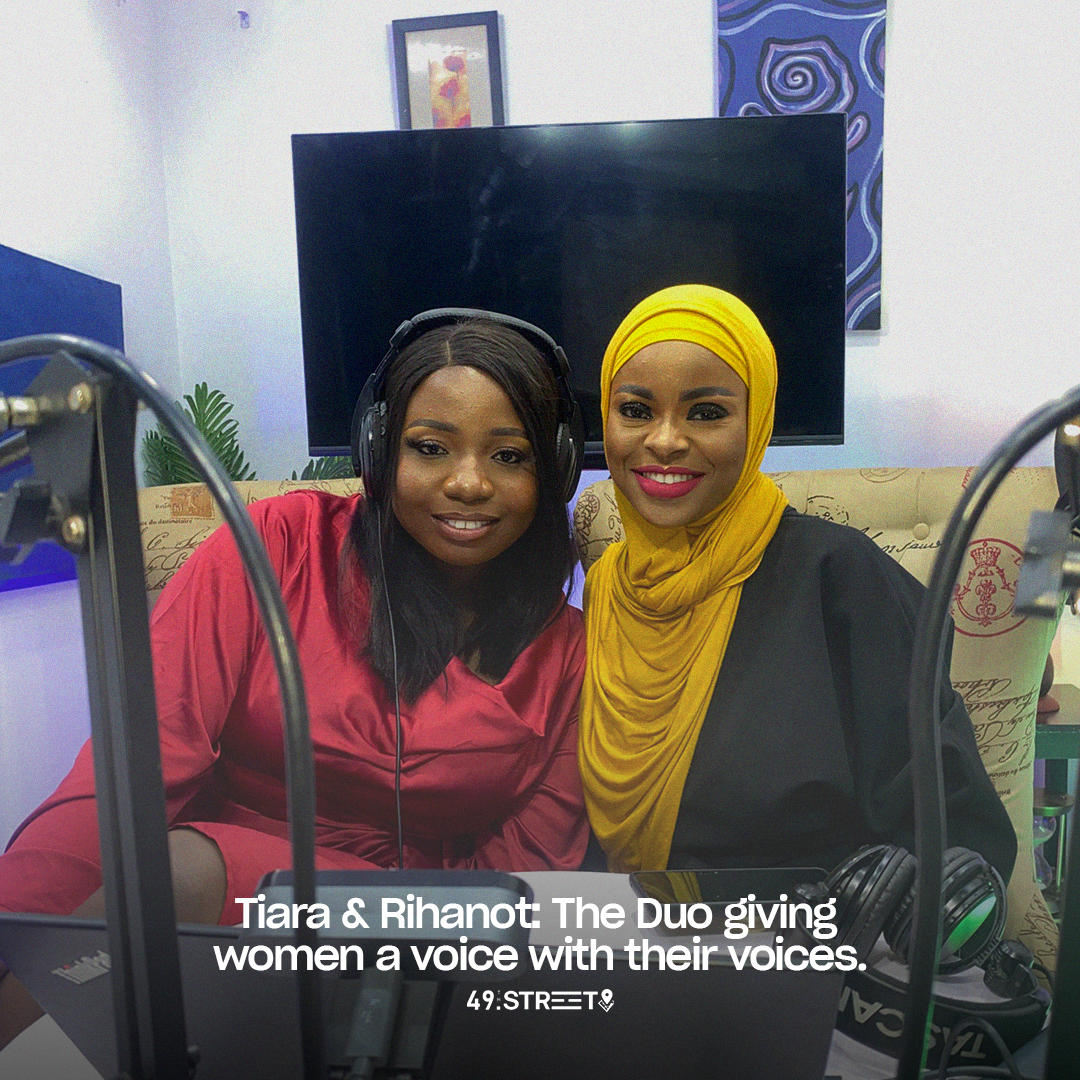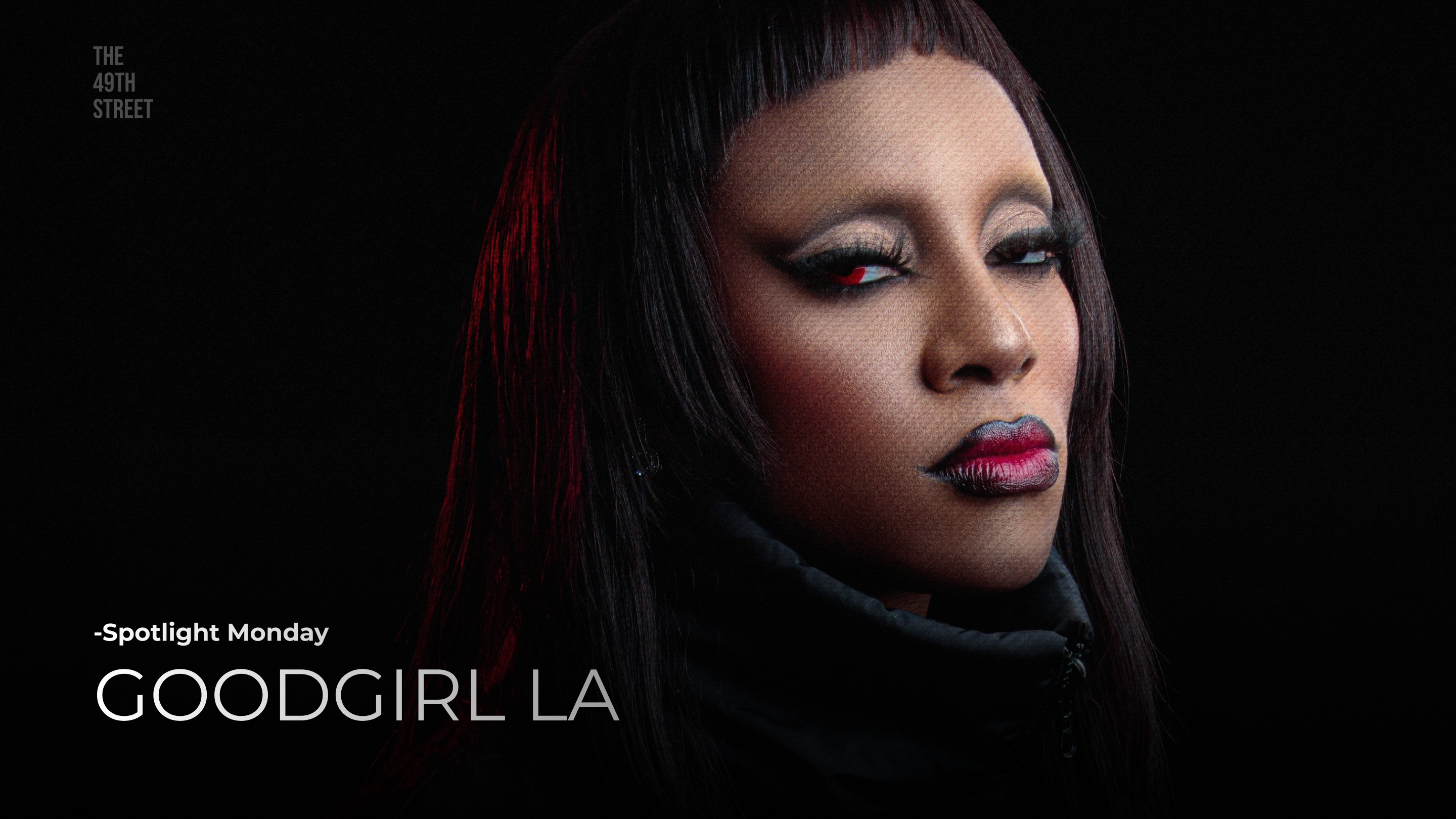From debunking misogynistic myths via Twitter Threads to creating a podcast to discuss with experts, Oluwabukunmi and Rihanot have gone from being Twitter faves to creatives in their own rights, using their voices for social good.
Personal Politics Podcasts have been a growing subgenre, with ‘podcast bros’ depicting a subgenre of people who use podcasts to spin a narrative about women, the things they are and what they do.
We sit down with Oluwabukunmi and Rihanot to discuss how they’re using their voices to spin an alternate narrative, a counter-narrative.
Tiaraoluwa: My name is Oluwabukunmi Tiaraoluwa Fadeyi, and I am a customer success lead in fintech. I’m very passionate about women, and this is the driving force behind my podcast. I’m a feminist podcaster and just a girl.
Rihanot: Hi, my name is Rihanot Ojo-Oba. I’m popularly referred to as the kindness ambassador because no matter what we do, it’s important to treat each other with love and kindness. I’m all about standing against injustice, especially about women, and it is what our podcast, The Counter Narrative, is all about.
We talk about so many issues, from motherhood to male loneliness to domestic violence. We talk about these issues, and we back them up with research and statistics.
That’s great. I like the name a lot. You know there’s been a shun against podcasters, how did you decide on choosing a podcast as a medium for doing what you do?
Tiaraoluwa: we started with Twitter threads to counter these misleading narratives, backing ours with facts and statistics as we do.
However, we thought about how we could reach a broader audience, the ones not on Twitter because misogyny is a global problem, the patriarchy unites cultures and religions. We are aware that podcasting has a bad reputation but a bad fruit does not guarantee that the rest are bad.
We decided we’d be one of the good fruits in the podcast industry. We wanted to get Counter Narrative out there, and podcasting seemed like the best option to start with.
That makes a lot of sense. Rihanot talked about what inspired her to start Counter Narrative. Do you have anything to add to that?
Tiaraoluwa: We saw a lot of ridiculous misinformation going around and this birthed the idea. We wanted to shut down these misinformation because they aren’t just an online thing, people can consume them and end up practicing them.
We started Counter Narrative to put out the truth and in turn protect women from these misleading narratives.
What have been your challenges in the podcast political space as women?
Rihanot: For me, people have always known me for someone who talks about kindness, birth control and love and motherhood and anywhere violence is mentioned I’m always there speaking against it but with the podcast, it leans towards feminist matters and people I know would complain about it.
Some would even say we hate men but I’d always tell them that we cover a lot of real topics in our podcast. No one is attacking men, we’re only here to enlighten.
Wow. Tiaraoluwa, do you have anything to add?
Tiaraoluwa: A challenge we face is people trying to push back on the facts we provide, claiming we bend statistics to fit our narratives, but we don’t. We always speak to researchers on our podcast and we’ve had nine episodes so far. Seven of the researchers were women while the remaining two were men.
People claim we only bring in people aligning with our opinions and I’m like, “that’s the whole point.” But we’ren’t just bringing just anybody, we’re bringing credible people that have studied these matters.
They always claim that we’re angry, which is a moot point because anger is a valid emotion when we think about the subpar privileges women have been handed for the longest time. Even in the medical field, women’s concerns are downplayed by male doctors so how can one be aware of these issues and not be angry? Demonising this anger is just invalidation.
Personally, I find it interesting how men demonise women’s anger but won’t keep the same energy with black people’s anger. I hate to bring up the analogy, but that’s actually what it is.
Rihanot: It’s ridiculous
Tiaraoluwa: I actually have this belief that women’s anger will change the world. International Women’s Day was born from anger. Appealing to the patriarchy in your fight against it would never work.
Yes. Nothing has been changed by being nice; you’d have to shake up the oppressor and such. So why do you think it’s important for women to have a voice in these conversations?
Tiaraoluwa: The world, as we would have it, is being narrated by men. I was about 19 or 20 when I properly read about Funmilayo Ransom Kuti, before then, I’d only known her as the first Nigerian woman to drive a car. And that was ridiculous. I read more about her and discovered she led riots and did so many great things but all she’s known for by most is being the first Nigerian woman to drive a car. She didn’t just BUY it like everyone thinks, she actually struggled with a white man preventing her passage to the palace and snatched his car.
The world is narrated by them and more women have been left out or underrepresented in the history books to cater to men’s taste. We want to rectify this, we want to let more people know of these great things these great women have done. When women narrate their own history, they would put more context into it and we have taken it upon ourselves to do this.
The scale of women in politics compared to men is so unbalanced, we need more women to take up space because so many laws are anti women, we need women to change that.
Women’s rights are so behind and it’s important we have women to champion this in the political space.
Rihanot: It’s shouldn’t just be women but feminist women.
Yes, that specification is important. Patriarchal-leaning women cannot do this.
Rihanot: Yeah, for example, the story of a woman who was a victim of domestic violence and few days later she was hugging her abuser husband with a governor of a state. We should not reconcile abuse, any form of it. But when the system is deeply rooted in patriarchy, like the one in this country, people think abuse can be reconciled and resolved. What is the Ministry of Women’s Affairs doing? Why do they watch women suffer and allow it to be written off as family discord? Why does the marital rape not rape argument exist?
It shouldn’t be just any women in these political spaces but feminist women. Women and girls are on the receiving end of so many ills in this society and it’s really important that our voices are being heard. When women are leaders, they rule with empathy.
It’s sad when someone you expected better from make statements like this
Rihanot: This is one of the reasons why I love the podcast. Someone in 100 level twenty years from now can learn something valuable from it because we’re still going to be having such conversations. We’re still going to be dealing with toxic masculinity, sexism, coercive control and medical misogyny.
Unfortunately, so many boys are regressing while girls are progressing. It feels like women and girls are going to be doing the work for these boys. It is exhausting trying to make someone understand something as basic as respect.
I have a brother, and I’d always tell him, “If you fuck up, you’ve have to deal with the consequences.” We can only hope that these young boys end up doing the right thing.
It’s an uphill battle. You guys are doing so much. Last question and it’s a deep one. What do you hope the public gain from the podcast?
Rihanot: We have diverse guests. We’ve had one from Australia, one from the UK, USA and even one from China. We hope to have audiences from all over the globe. We want Counter Narrative to be a medium people can use to share their research.
Tiaraoluwa: We want to amplify women’s voices and hope in the long run, we have an audience who trust us not to lie to them. We want women to see themselves as equals to men.
When we talk about misogyny, we get gaslit, so we hope our credible guests get to clear up such mental gymnastics and bring about clarity. We want women to understand that sexist narratives do not define them.
We want to expand politically, reaching lawmakers and getting them to make laws and policies that protect women. We just want to talk, we want delivery and change.
Okay. On a more individualistic note, what do you want women to take away from your podcast?
Tiaraoluwa: I want women to know that they are not inferior or subhuman. I want victims of abuse to understand that what they went to is not in anyway their fault. I also want women to know that the world is their oyster.
Rihanot: I like that our podcast is relatable. After our first episode on single women over 30, we had a lot of women sharing their own experiences and it felt like a community. We are each other’s community and outside the research and statistics we bring, we are girl’s girls and I love that.
It’s really admirable that you’re doing this because you provide knowledge, and knowledge makes it hard for anyone to declare any narrative as facts.
Rihanot: Exactly. Not to brag, but you can’t drag our guests because they’re fully backed by research and facts. It’s such a great thing, and we’re happy doing this, Tiara and I.
Tiaraoluwa: Yes, we are. Thank you for having us. Tell your people to follow us o!





